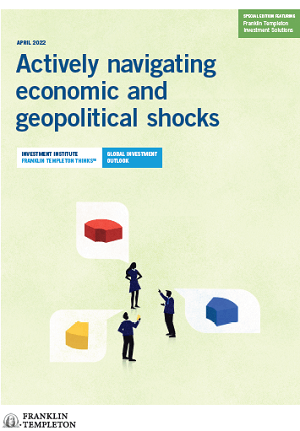Michael J. Stephen Dover, CFA, Chief Market Strategist, Franklin Templeton Investment Institute
with Gene Podkaminer, CFA, Head of Research, Franklin Templeton Investment Solutions
Introduction
Russia’s invasion of Ukraine has caused broad destruction and terrible turmoil on a humanitarian level. This has led to a series of shocks to the global economy and political order. At the Franklin Templeton Investment Institute, we seek to identify how these shocks might have persistent and significant impacts on the global economy, capital markets and long-term investment returns.
- Russia’s invasion of Ukraine does not signal the end of globalization. We anticipate shifting sources of production and investment flows will result from today’s economic dislocations. Worldwide, countries will need to reconsider energy and food security risks. Trade and investment flows will shift, and how countries cope will have a large impact on future economic growth, the distribution of income, after-tax returns, inflation, interest rates, and political and financial stability in countries large and small. The implication is not de-globalization as much as it is re-globalization.
- Global growth expectations are being reset downwards as uncertainty is permeating through businesses and consumers. While Western Europe’s proximity to the war puts it at greatest risk of stagflation, we do not expect conditions anywhere else in the world will trigger a combination of enduring stagnation and inflation.
- Inflation remains elevated and is likely to be pushed higher by surging global energy and commodity prices due to war, sanctions and the threat of supply disruptions. Supply-led inflation is particularly concerning when it comes with an energy shock. Energy is used in many facets of the global economy from production through consumption. However, energy does not hit every sector equally. Will companies react quickly to inflation, and will they be able to pass on costs to consumers? Which countries might pick up the slack in commodity production?
- For investors who’ve known nothing except low and stable inflation, this is a new world that creates volatility due to uncertainty. If one could make the case for active management, we think now would be the time. Heightened market correlations make achieving excess returns more challenging, and a wider dispersion of returns provides an opportunity for active managers to pick up alpha (above-market returns).
We will be monitoring the aforementioned factors closely as the year unfolds and wish peace to the people of Ukraine.
